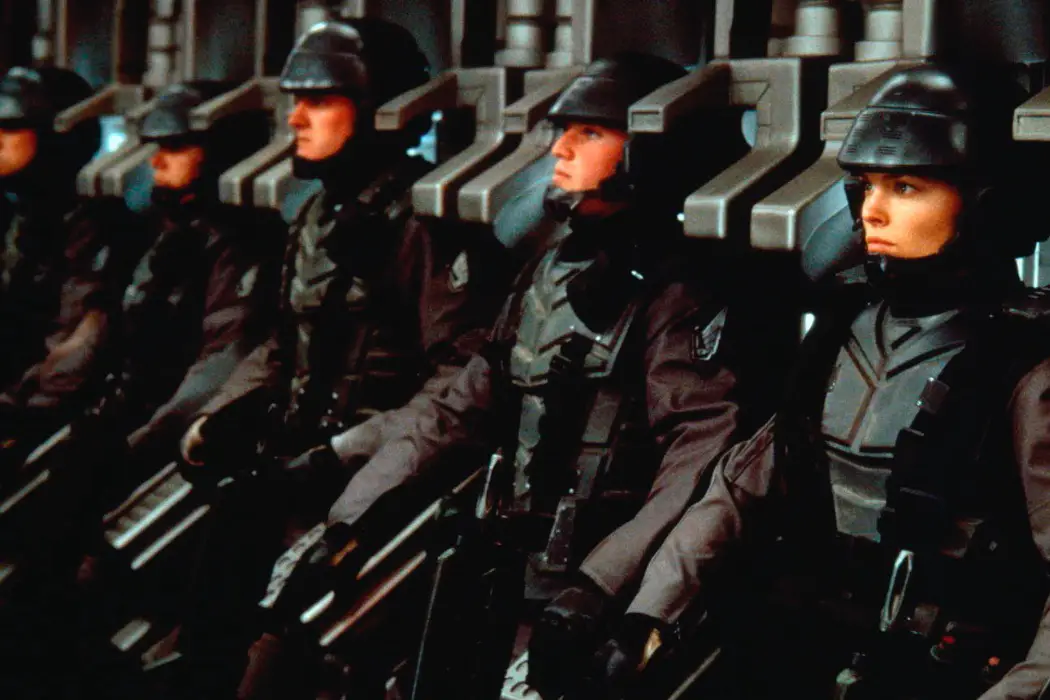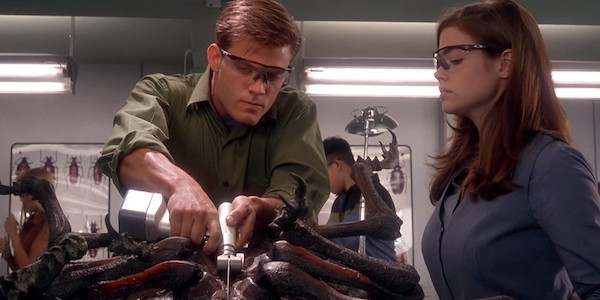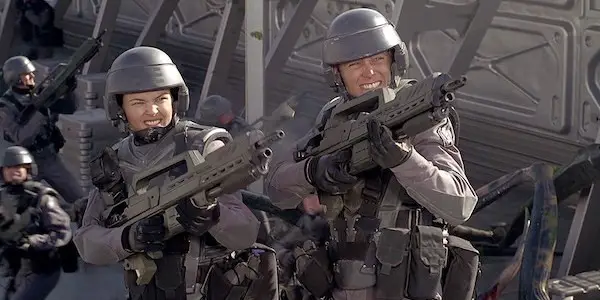Satire For Jocks: The Anti-Fascism Of STARSHIP TROOPERS

A writer in Australia, Sean used to be a TEFL…
Starship Troopers is a trenchant, satirical commentary on fascism, the military-industrial complex, and our love of violence, masquerading as a dumb actioner, featuring pretty people spouting cheesy dialogue, amidst CGI carnage and bare boobs and butts. Upon its release in 1997, it was critically derided as being only the second part of my description. Some critics argued that it glorified the very things it satirised while others saw no value below its surface of broad action movie tropes and corny plot.
When I first saw this movie in 1997 (aged 13), I only saw the flashbang theatrics of the violent set-pieces and the coolness of the whole thing. I guess a movie called Starship Troopers doesn’t instantly make you look for anything more than what’s right there in front of you (or if you’re my wife’s university tutor, you look past what you’re seeing to declare that the brain bug at the end is a representation of “the aborted fetus of feminism”. An interpretation we will not be addressing here.)
A re-watch every few years managed to show me what exactly it was Paul Verhoeven and writer Edward Neumeier were doing and saying with the movie. This led to some further reading/watching/listening, which led me here and the question: how does Verhoeven manage to create something that works so well as satire but also so well as a dumb actioner?
Johnny Got His Gun
The satire is both hidden deep and resting on the surface. The plot of the movie follows Johnny Rico, a teenager from Buenos Aires, who leaves home to join the mobile infantry so he can kill aliens, become a citizen, and be with his high school sweetheart. Things go awry when the enemies of the Earth – the Bugs – attack, destroying Buenos Aires and sending Rico on a course for war.

The presentation of the movie as simply the classic war story of a boy going off to war and coming home a man is misleading as even though we open with Rico as a jock in high school going through jock in high school problems: girlfriend still hasn’t had sex with him, he has to win the big game, the teacher’s calling on him in class, etc. Verhoeven adds in extra information that reshapes what we’re seeing if we’re paying attention. Firstly, the opening is set in Buenos Aires and yet our four main characters: Johnny, Carmen, Dizzy, and Carl are all played by Caucasian Americans (a trait that applies to pretty much all of the characters at this Argentinian high school). Johnny Rico and Carmen Ibanez are played by Casper Van Dien and Denise Richards who hail from Florida and Illinois respectively, a move that could be called white-washing if I didn’t feel as though Verhoeven was making a joke/comment about the Nazis fleeing from Germany after the second world war and settling in Argentina. This is the only time I’ve ever seen white-washed casting that doubles as world-building.
It is at school that the satire is briefly dispensed with and, if we’re paying attention, we hear Michael Ironside’s character Mr Rasczak, talk about how the world got so shiny and clean:
“This year we explored the failure of democracy. How our social scientists brought our world to the brink of chaos. We talked about the veterans, how they took control and established the stability that has lasted for generations since.”
It’s only one line of dialogue, and I’ll confess, the first few times I watched this movie I didn’t process it. It might just be something built into my brain that makes me ignore teachers when they’re talking, who knows? But here we get the whole world in three sentences, and this level of on the nose world-building never happens again. The rest of the world we have to build from the propaganda inserts that appear every few scenes to give us some exposition and jokes, all while being visually influenced by Leni Riefenstahl and infused with Nazi imagery: metal eagles, guns, crisp black uniforms, etc.
What Verhoeven gives us with these early school scenes is a plotline and visuals comparable with Saved by the Bell or 90210, but with a strange undercurrent of Fascism that keeps us off balance. A world in which democracy has collapsed and war reigns supreme should be a dystopia, and yet the bright-eyed, fun-loving students seem to be living it up. The movie is like The Hunger Games but if we only saw what life was like in The Capital.
Earth Uber Alles
This kind of movie is not the usual place for subtle satire. Action movies tend to lean more towards allegory, as with Aliens being allegorical of the Vietnam War rather than being a satire of that conflict. And if they are satirical, the satire is written across the screen in bright neon letters like in Hot Fuzz, an action movie that satires/plays homage to other action movies.

That is the beauty of Starship Troopers though, and why the movie is important, especially in this day and age where Neo-Nazis have begun to crawl out of the sewers and present themselves to the world. Starship Troopers is a movie that shows that this kind of thing doesn’t come at you twirling its moustache or wearing a black hat. In Troopers, the people under the fascist regime are clean, bright, happy, and appear well-adjusted. The only problem is that violence is heavily ingrained into them to the point where they hunger for war, and when they go to war, human life is pretty cheap. Consider that Rico’s promotions all come from the maiming or death of another character. When Rasczak mercy kills one of his officers and gives the man’s role to Rico, there is no mourning for the dead man just celebration, as though Rico earned the role with just his skill, not with the added death of another human being.
However, that kind of thing is par for the course in an action movie. We don’t think about the lives of nameless characters who need to die for our hero to progress. If they really meant something they would get an earlier line of dialogue about being a new parent or being near retirement before they died. Verhoeven uses the genre and its tropes to lower our defenses and get the hidden meaning right into our brains, something he did in 1987 with Robocop, another movie that was seen by some as a silly actioner that glorified fascism and police violence rather than what it is: a satirical take on the Christ story, i.e. what if Jesus rose from the dead and wanted revenge.
But there are also subversions of these tropes even without the added seasoning of anti-Fascism. The main subversion comes from the portrayal of women in this movie, especially Dizzy and Carmen. Traditionally, the roles of women in the 80s and 90s action movies were eye-candy or damsel-in-distress, or usually both. In Troopers, the two female leads are presented as capable, tough, and also with their own agency as they both know what they want and are not afraid to pursue it whether it be Johnny Rico or a military career. The movie doesn’t force them into a situation where it’s either romance or action; it lets them try and have both, much like male characters have been allowed to do since the dawn of cinema.
Anti-Fascism in Starship Troopers: Conclusion
You know that meme where an image is shown and under it, it reads THIS THE FUTURE LIBERALS WANT? I can’t exactly say that Starship Troopers is the world Neo-Nazis or the Alt-Right want (mainly because there is a scene that shows a black woman in a position of power and the general gender neutrality on display), but it is pretty close. Verhoeven shows us a world where democracy has failed, and military rule and unquestioning loyalty to the state has won. And yet, even with this ‘utopia’ in place, the only thing people are doing, in Verhoeven’s own words, is “killing f*cking bugs”.
The thing is, with Mr. Rasczak’s little speech at the start he is foregrounding what we’re seeing, but the problem is we’re too distracted by the pretty guy and girl and their relationship problems to hear when we’re being warned of something that is right there in front of us.
It is a shame that critics didn’t see what this movie was the first time around as this is the kind of thing we need on screen. Not everyone wants to read a book or watch a documentary but if you can present a message hidden in genres that are unfairly considered low-brow you can get that message across to people who may not want it told directly to them. We are beginning to see a few movies like that with Thor: Ragnarok’s subtle anti-Imperialism message being a recent example, and I hope we see more of this in the future as filmmakers see that it is possible to say a lot hidden in all the explosions and car chases.
Do you think Starship Troopers is a satire? Or are people right when they say it glorifies this kind of future? What other action movies do you think are hiding a satirical message? Let us know in the comments below!
Does content like this matter to you?
Become a Member and support film journalism. Unlock access to all of Film Inquiry`s great articles. Join a community of like-minded readers who are passionate about cinema - get access to our private members Network, give back to independent filmmakers, and more.
A writer in Australia, Sean used to be a TEFL teacher and is now an academic consultant. He has been published in The Big Issue, Reader's Digest, Talk Film Society, and Writer Loves Movies. His favourite movie is The Exorcist and he prefers The Monster Squad over The Goonies. He is also the co-host of the Blue Bantha Milk Co. YouTube channel.












